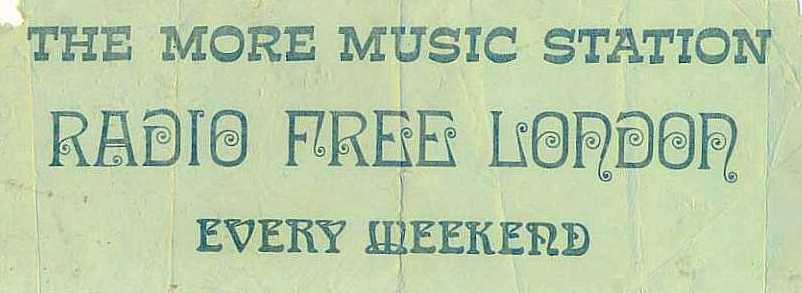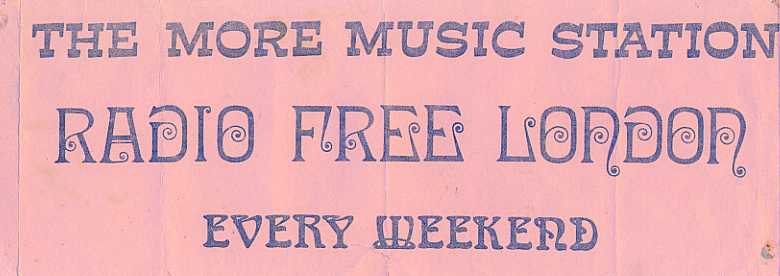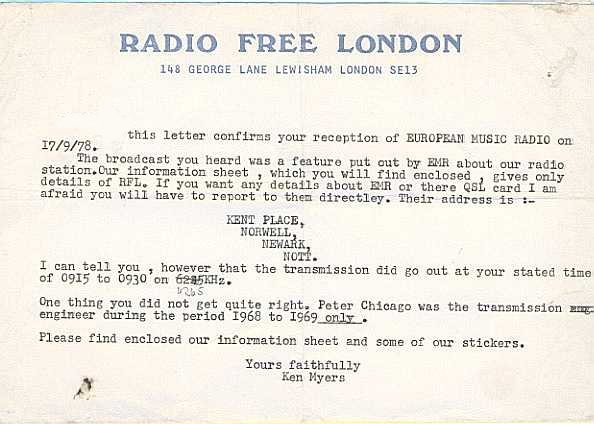Radio Free London first came on the air in August 1968, on the first anniversary of the closure of Britain's offshore stations. A transmitter of moderately high power was set up in a flat at Shepherd's Bush, where many of Radio Caroline's former staff had taken refuge. Their aerial was a long horizonal wire which ran across a street and a railway line and was tied to the fire escape of a BBC building. This was the first test transmission and over the next few days RFL continued broadcasting intermittently with advertising for the first major Free Radio Association Rally, which was to be held in Trafalgar Square on August 17th of that year. An estimated 5,000 Free Radio supporters attended the rally when speakers included former pirate DJs Robbie Dale, Stevi Merike, Ian Damon, Spangles Muldoon and Lorne King. An additional surprise for the supporters was the appearance of the founder of Radio Caroline, Ronan O'Rahilly. RFL continued broadcasting every Sunday until early 1969 when it disappeared from London's airwaves.
Although RFL did reappear briefly on FM in 1970 just hours before the launch of the BBC local station Radio London, it was not to be heard on a regular basis until March 1973 when it once again broadcast to London every weekend this time on 92.8VHF. This phase of RFL lasted until November 1974, when four members of staff were caught during a raid at Hayes Common in Kent, and once again RFL disappeared from London's airwaves.
The second phase of the FM service reappeared in late 1978 during a snow storm, once again broadcasting from the woods and fields on the outskirts of London, but within twelve months the station has moved to the rooftops of South London's high rise tower blocks. This phase of Radio Free London was the longest period the station broadcast to the capital which lasted for over five years with eight hours of programming being broadcast every Sunday.
Throughtout the 1980's RFL could be heard playing the finest rock music but listenership to the station began to fall by the time the 1990's had started and the introduction of the new legal Radio stations which were slowly coming on the air, the need for a rock pirate station became less.
The heyday of RFL was between 1978-1983 when it broadcast a rock format to London every Sunday from the high rise tower blocks of down town South London with a very slow reel-to-reel machine carrying the 14+ hours of programming on FM.
RFL was also featured on SW, via European Music Radio, and received
many enquiries from all over Europe.

A couple of tatty old stickers from the late 70s.

The station came and went throughout the 80's and early 90's. The last high power broadcast from the station was from Mottingham in Kent when it was heard in stereo, with live and taped programmes for two days over Christmas 1992.
Radio Free London was silent until March 1995, when low power tests were heard on 99.1 FM on Sunday as Wednesday evenings it was not until six weeks later at Easter when regular shows were heard once again, twice a week for three hours a night incorporating old timers Kenny and Mark and well known voices from the shortwave scene Jodie (ex Radiofax), Terry Phillips and Andy Walker plus new boy Eric May. Because of lack of response from the listeners the FM service was closed and a move to SW was made in November 95, giving European listeners the chance to hear the UK's oldest landbased pirate station.
From the humble start of the station on SW and only four hours of broadcasting using a car battery, we have now had mains power at our site for a year now and since then we have broadcast a 24 hour output twice a month. Former "Radio Jackie" site member and presenter Tony Randall has joined us after a 20 year break from free radio and can now be heard on RFL every month. Mark Ashton has since moved away from London to Kent, but still keeps in contact and has recently printed our large red car stickers. He has promised to do some programs in the future but we are not holding our breath.
A frequency of 6400kHz was used as this had proved to work well in the past with other stations, but as RFL was new to SW and 6.4mHz was out of the main 48m pirate band, a move was made to 6285kHz to build up an audience. This we did and after a few months we moved back to 6400kHz with some very good results using only 15 watts of power from a car battery. Just before Easter 96 a mains supply was installed at our site and 24 hour broadcasts started on our 1st and 3rd Sundays on the air. In June 96 RFL started broadcasting on 3945kHz in the 76 metre band on a Saturday evening and through the night into the Sunday morning and soon both frequencies were used in parallel with our transmitters staying on the air for the full 24 hours of air time with programs broadcast on a continuous loop cassette machine with four one hour shows, repeated every four hours.
At Christmas, a week long broadcast was made with the usual four hour loop and tape changes made every day. A total of 170 hours of broadcasting time was clocked up during that week, with our two transmitters staying on the air non-stop throughout the Xmas week.
Everything was going great, we had now not only a large amount of letters being received at our postal address but also RFL was on the Internet with an E-Mail address and a mobile phone which was used to take calls from our listeners every time we were on the air, but it was all soon to come to a sudden halt, when some children found our site and equipment, luckily we were in the local pub having a drink and caught them as they switched off the transmitter. A move of site was made to wooded area outside of London, but what was to happen on Sunday evening April 20th could not have been foreseen!
We had over the course of three weeks installed mains power and two aerials at a wooded site on the side of the M25 motorway, at Junction four in Kent. On the evening of April 19th our two transmitters and a continuous play cassette machine were installed and once again RFL took to the airwaves as usual with good signals being heard throughout the UK and Europe. Everything went well and the time switch turned off the equipment as it always had 24 hours later.
Around 2200hrs that evening someone stumbled across our equipment,
(we believe it was a motorway maintenance worker) who telephoned the Police
who believing it was a suspect package closed the motorway between junctions
three and five while the bomb squad were called in to investigate. There
must have been some red faces in high places when the packages were found
to be nothing more that a pirate radio station.
Below is a copy of the story that appeared on South-Eastern teletex the following day:
Teletext Page 339
April 21st 1997 21:28:20
London
M-WAY CLOSURE BLAMED ON RADIO
A pirate radio station is believed to
have caused a bomb alert that closed
the M25 motorway for two hours.
Police shut the motorway at junction
four after a member of the public found
wires leading from the slip road into
nearby woods, and connected to a box.
The bomb squad examined the box but
decided it was harmless. The DTI are
now investigating the transmitter.
Regional News 331 Sport 170
REGIONAL NEWS, SPORT & TRAVEL P330
Our
move to the 51 metre band, 5805kHz has so far been a great success,
with good signals heard across the UK and Europe. The move was made
when our regular frequency of 6400 become more congested with QRM
and interference from Radio Korea. We carried out a couple of
tests with only 12 watts of power which had the free radio scene buzzing
on hearing clear strong reception almost everywhere. Some RTTY
as been noted on the channel of an evening but during the day the 5805
slot remains mostly clear making it a very good choice for broadcast
use. Let's hope it stays that way.
"Still operating illegally, unlicensed and free"
RADIO
FREE LONDON 1968 - 1997
(Written
in 1997 by Andy Walker)
